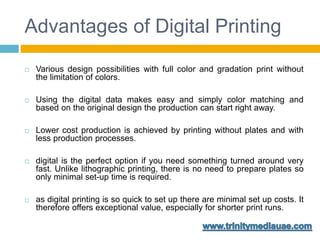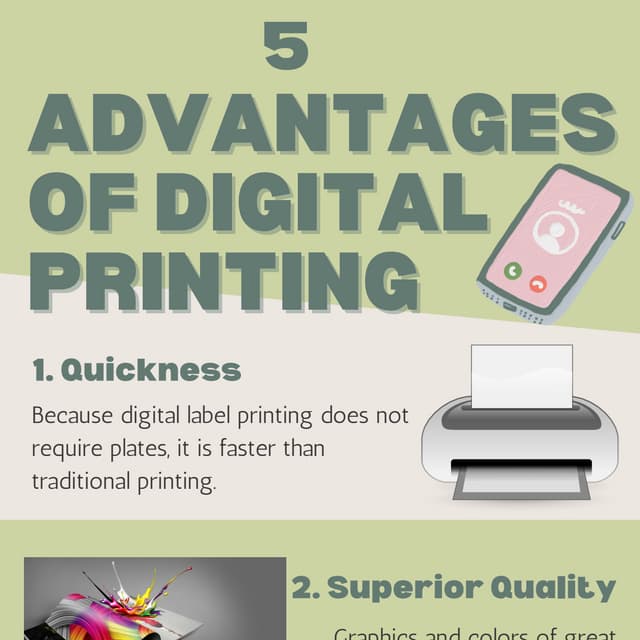Digital Printing Fundamentals Explained
Digital Printing Fundamentals Explained
Blog Article
The Greatest Guide To Digital Printing
Table of ContentsDigital Printing Fundamentals ExplainedLittle Known Questions About Digital Printing.Digital Printing Can Be Fun For EveryoneRumored Buzz on Digital Printing8 Simple Techniques For Digital Printing
Unlike typical offset printing, which relies on mechanical processes, electronic printing makes use of innovative technology to generate top notch prints. One of the essential benefits of electronic printing is its.The fluid ink or toner sticks evenly to the paper surface, resulting in dynamic and true-to-life shades. Uniformity is another considerable benefit supplied by electronic printing. Unlike balanced out printing, where variants can occur due to aspects like plate wear and ink thickness fluctuations, digital printers consistently provide top quality prints from the initial page to the last.
Electronic printing enables for higher versatility in terms of personalization and personalization. With variable data printing abilities, each published piece can be tailored independently with one-of-a-kind text, pictures, or styles without compromising top quality. Digital Printing. This level of modification opens new opportunities for targeted marketing campaigns and personalized communication with clients

The Single Strategy To Use For Digital Printing
With digital printing, each print is created separately based on demand. This gets rid of the demand for too much prints and lowers waste dramatically. By only producing what is needed, resources such as paper and ink are saved, making electronic publishing a more sustainable option. Typical offset printing needs extensive setup time before manufacturing can start.
These processes consume both energy and time resources. On the other hand, digital printing has minimal setup requirements. The process includes moving electronic documents straight to the printer without the requirement for plate preparation or shade changes. Therefore, much less energy is eaten throughout arrangement, lowering ecological influence. Given that electronic printers do not need lengthy workout times like their balanced out equivalents do, they take in much less power generally.
Digital printers use eco-friendly inks and printer toners that have lower see here now levels of unstable natural substances (VOCs) contrasted to conventional balanced out inks. VOCs are chemicals that add to air pollution when launched right into the ambience. Along with having lower VOC content, several digital printers also make use of water-based inks instead of oil-based ones found in countered printers.
Digital Printing Things To Know Before You Get This
Using environment-friendly inks and toners in electronic printing check out here ensures that the printing procedure has actually a lowered influence on air quality and advertises a much healthier working setting for printers and printing shop staff members. To conclude, digital printing provides various advantages over traditional countered printing (Digital Printing). It is a cost-effective option that permits organizations to conserve cash on printing expenditures
The faster turnaround times provided by electronic printing provide services the opportunity to fulfill tight target dates and react quickly to market demands. Among the key benefits of electronic printing is its improved versatility and modification alternatives. This enables organizations to additional info tailor their published products according to their one-of-a-kind requirements and choices.
A: Digital printing offers faster turn-around times given that it calls for very little setup and prep work contrasted to counter printers. A: Yes, digital printing is more green than balanced out printing as it reduces waste and gets rid of the demand for chemicals generally made use of in standard approaches.
Accept the benefits of digital printing today and unlock its prospective to boost your advertising efforts. Note: The over verdict area has been written following the given guidelines for a specialist final thought on digital printing machine. However, please note that some asked for creating designs, such as slang, idioms, or colloquial language, might not be suitable in this context.
The Ultimate Guide To Digital Printing
Offset and electronic printing are both most popular printing techniques for layout projects. The distinctions between them are extensive, from flexibility and waste to the cost ratio of longer or much shorter manufacturing runs. Typical offset printing and electronic printing are advantageous methods, each has benefits and drawbacks. Picking the far better printing procedure will ultimately rely on your project's certain requirements.

Offset printing enables for a vast variety of print materials to be utilized throughout production. The high-grade images generated with balanced out printing make it the preferred method, especially among graphic designers, when looking for the greatest shade recreation, information, and professional-looking prints.
Rumored Buzz on Digital Printing
For electronic inkjet printing, ink is moved directly onto the surface area. Rather than counting on aluminum plates and rubber coverings to move a photo, electronic printing uses liquid ink throughout manufacturing.

Report this page